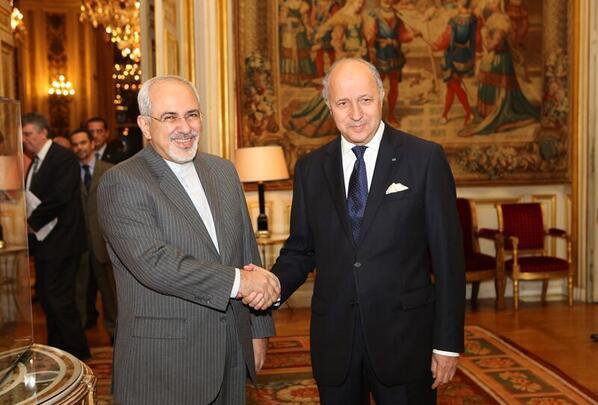 PARIS, Nov 6 (Reuters) - Iran's Foreign Minister ended a two-day visit to France�on Wednesday, a country he said was the most intransigent among the six world powers - including the United States - that he will face at nuclear talks this week.
PARIS, Nov 6 (Reuters) - Iran's Foreign Minister ended a two-day visit to France�on Wednesday, a country he said was the most intransigent among the six world powers - including the United States - that he will face at nuclear talks this week.Mohammad Javad Zarif, the international face of the government that replaced Mahmoud Ahmadinejad's hardline administration in August, said he wanted a "new role" in the world for�Iran, a nation increasingly isolated over its nuclear programme.
"We have a new world. We need a different approach, all of us, to global affairs," Zarif told Reuters TV, smiling in front of dozens of cameras before giving a speech to the general assembly of the U.N. cultural agency UNESCO.
"Iran�is ready to play that new role in that different international environment," he said.
Paris has been one of the strongest advocates of sanctions and former President Nicolas Sarkozy successfully pushed for a European Union oil embargo and stricter controls over Iran's central bank.
While President Francois Hollande was the first Western leader to meet President Hassan Rouhani in September, the tone from Paris since has been more prudent than others in the "P5+1" - the United States,�Russia, Britain,�China�and�Germany�- as Tehran pressed ahead with a diplomatic charm offensive that it hopes will lead to an easing of sanctions.
"Iran�must respond in a concrete and verifiable way to the concerns of the international community, because negotiations cannot be indefinite," Roman Nadal, a foreign ministry official said after Zarif met with his French counterpart Laurent Fabius, the first time an Iranian foreign minister has been received in Paris for four years.
The talks that begin on Thursday in Geneva aim to end a standoff over the nuclear programme, which Western powers suspect is aimed at developing nuclear weapons, despite Iran's denials.
"RAPPROCHEMENT OF CULTURES"
Zarif's two-day agenda was carefully picked. Two interviews to French media both stressed a nuclear deal was possible quickly, and in a full-page spread with France's most well-known daily Le Monde he asked Paris to be more flexible.
When asked whether�France�was more intransigent than the United States in its approach to nuclear talks, Zarif responded:
"Yes. We've seen better days with France. We've had historical links that have seen some ups and down. I hope we can move forward and that the French will be realistic, flexible and have a desire to reach a deal."
Highlighting the interest in Zarif, and perhaps long-term prospects if relations were to thaw, the French Institute for Foreign Relations, a think-tank that includes members of France's�business�elite, hosted Zarif for a discreet dinner on Tuesday night.
Not everybody was pleased. Members of the Paris-based exiled opposition group the National Council of Resistance of Iran (NCRI) came out in force near UNESCO to lament Iran's human rights record and decry his visit as an insult to the country's cultural heritage.
But that did little to deter the 53-year-old. Offering a traditional Persian silk carpet, named "The Rapprochement of Cultures", as a gift to UNESCO, Zarif took to the stand to deliver a 10-minute speech in English.
"War is not only illegal and immoral, but also an ineffective tool of promotion of national or global interests," he said. "History and experience tells us that only through dialogue, understanding and inclusive cooperation, can solutions for common problems be explored."
By Reuters
The Iran Project is not responsible for the content of quoted articles.











